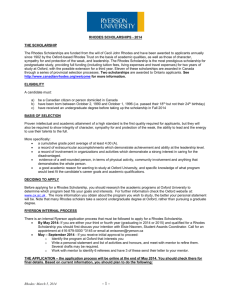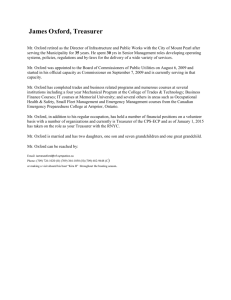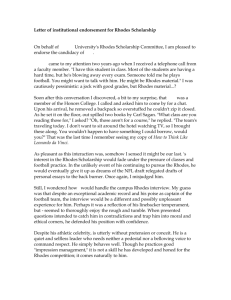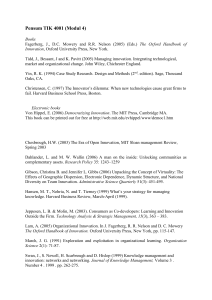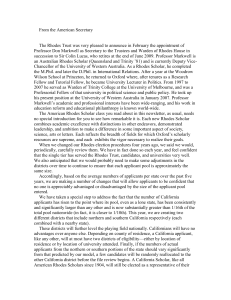2012
advertisement
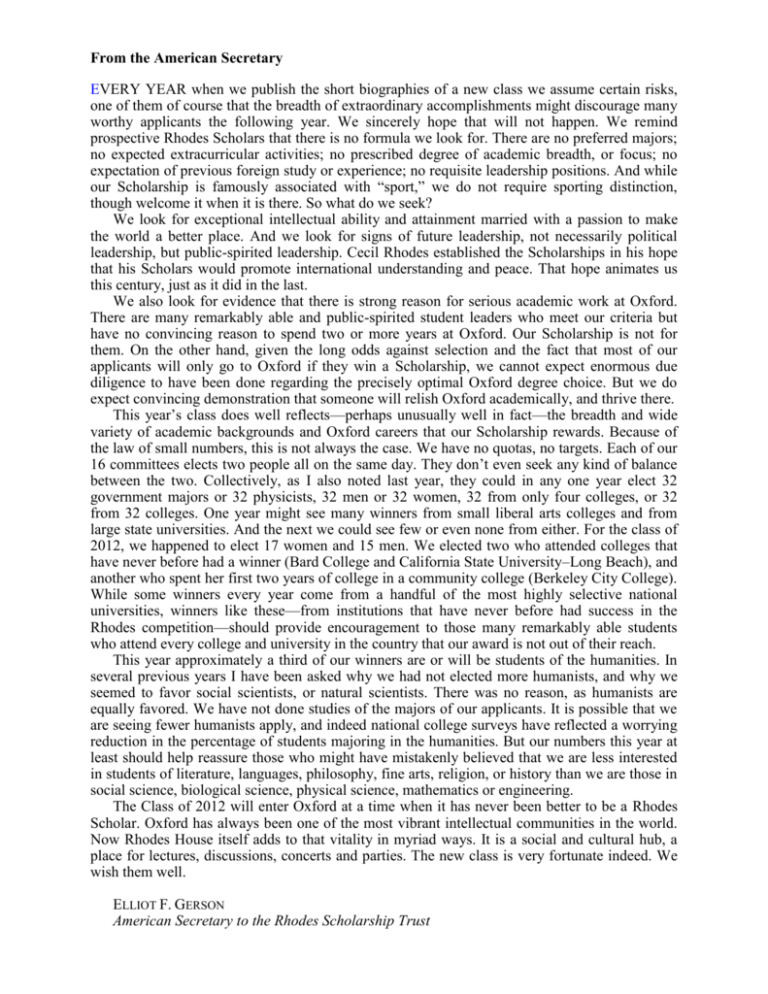
From the American Secretary EVERY YEAR when we publish the short biographies of a new class we assume certain risks, one of them of course that the breadth of extraordinary accomplishments might discourage many worthy applicants the following year. We sincerely hope that will not happen. We remind prospective Rhodes Scholars that there is no formula we look for. There are no preferred majors; no expected extracurricular activities; no prescribed degree of academic breadth, or focus; no expectation of previous foreign study or experience; no requisite leadership positions. And while our Scholarship is famously associated with “sport,” we do not require sporting distinction, though welcome it when it is there. So what do we seek? We look for exceptional intellectual ability and attainment married with a passion to make the world a better place. And we look for signs of future leadership, not necessarily political leadership, but public-spirited leadership. Cecil Rhodes established the Scholarships in his hope that his Scholars would promote international understanding and peace. That hope animates us this century, just as it did in the last. We also look for evidence that there is strong reason for serious academic work at Oxford. There are many remarkably able and public-spirited student leaders who meet our criteria but have no convincing reason to spend two or more years at Oxford. Our Scholarship is not for them. On the other hand, given the long odds against selection and the fact that most of our applicants will only go to Oxford if they win a Scholarship, we cannot expect enormous due diligence to have been done regarding the precisely optimal Oxford degree choice. But we do expect convincing demonstration that someone will relish Oxford academically, and thrive there. This year’s class does well reflects—perhaps unusually well in fact—the breadth and wide variety of academic backgrounds and Oxford careers that our Scholarship rewards. Because of the law of small numbers, this is not always the case. We have no quotas, no targets. Each of our 16 committees elects two people all on the same day. They don’t even seek any kind of balance between the two. Collectively, as I also noted last year, they could in any one year elect 32 government majors or 32 physicists, 32 men or 32 women, 32 from only four colleges, or 32 from 32 colleges. One year might see many winners from small liberal arts colleges and from large state universities. And the next we could see few or even none from either. For the class of 2012, we happened to elect 17 women and 15 men. We elected two who attended colleges that have never before had a winner (Bard College and California State University–Long Beach), and another who spent her first two years of college in a community college (Berkeley City College). While some winners every year come from a handful of the most highly selective national universities, winners like these—from institutions that have never before had success in the Rhodes competition—should provide encouragement to those many remarkably able students who attend every college and university in the country that our award is not out of their reach. This year approximately a third of our winners are or will be students of the humanities. In several previous years I have been asked why we had not elected more humanists, and why we seemed to favor social scientists, or natural scientists. There was no reason, as humanists are equally favored. We have not done studies of the majors of our applicants. It is possible that we are seeing fewer humanists apply, and indeed national college surveys have reflected a worrying reduction in the percentage of students majoring in the humanities. But our numbers this year at least should help reassure those who might have mistakenly believed that we are less interested in students of literature, languages, philosophy, fine arts, religion, or history than we are those in social science, biological science, physical science, mathematics or engineering. The Class of 2012 will enter Oxford at a time when it has never been better to be a Rhodes Scholar. Oxford has always been one of the most vibrant intellectual communities in the world. Now Rhodes House itself adds to that vitality in myriad ways. It is a social and cultural hub, a place for lectures, discussions, concerts and parties. The new class is very fortunate indeed. We wish them well. ELLIOT F. GERSON American Secretary to the Rhodes Scholarship Trust





